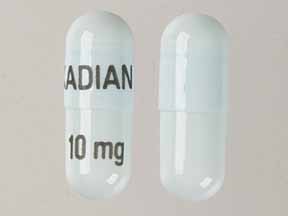
Morphine Sulfate ER Coupons & Savings Card – Discount Prices from $80.32
Generic for: Ms contin
My prescription
Edit
10MG, Morphine Sulfate ER (60 Capsule Extended Release 24 Hours)
Select pharmacy

CVS
$83.57
COUPON PRICE
Walgreens
$80.32
COUPON PRICE
Albertsons
$190.48
COUPON PRICE
Walmart
$253.10
COUPON PRICEMorphine Sulfate ER savings card
Show this card to your pharmacist
Walgreens
$80.32
BIN
ID
PCN
GRP
015995
LHKPW921260
GDC
DR33
Powered by
More prescriptions for pain
More prescriptions for pain
Price history for Ms Contin (brand) & Morphine Sulfate ER (generic)
60 Capsule Extended Release 24 Hours, 10MG
Average retail price for Ms Contin
Average retail price for Morphine Sulfate ER
Average SaveHealth price for Morphine Sulfate ER
Our price history data is based on aggregated prescription data collected from participating pharmacies in America. Our prescription data updates daily to reflect the latest price changes. If you notice a missing data point, it means there wasn't sufficient data available to generate a monetary value for that date.
We analyzed Morphine Sulfate ER prices for (10MG, 60 Capsule Extended Release 24 Hours) over the last 12 months. The average retail price was $295.80, while the average price using the SaveHealth discount card was $175.03. That's a savings of approximately 40.83% when using our Morphine Sulfate ER coupon.
Compared to the generic version, Ms Contin had an average price of $351.28 over the same time period. With the SaveHealth savings card, Morphine Sulfate ER is 50.17% cheaper on average than Ms Contin.
*Retail prices are based on pharmacy claims data, and may not be accurate when we don't have enough claims.
Morphine Sulfate ER dosage forms
Dosage Quantity Price from Per unit 10MG 60 Capsule Extended Release 24 Hours $83.57 $1.39 10MG 100 Capsule Extended Release 24 Hours $135.08 $1.35 20MG 30 Capsule Extended Release 24 Hours $42.64 $1.42 20MG 60 Capsule Extended Release 24 Hours $66.97 $1.12 20MG 100 Capsule Extended Release 24 Hours $99.42 $0.99 30MG 60 Capsule Extended Release 24 Hours $66.97 $1.12 30MG 100 Capsule Extended Release 24 Hours $99.42 $0.99 50MG 60 Capsule Extended Release 24 Hours $102.41 $1.71 50MG 100 Capsule Extended Release 24 Hours $158.48 $1.58 60MG 60 Capsule Extended Release 24 Hours $116.20 $1.94
| Dosage | Quantity | Price from | Per unit |
|---|---|---|---|
| 10MG | 60 Capsule Extended Release 24 Hours | $83.57 | $1.39 |
| 10MG | 100 Capsule Extended Release 24 Hours | $135.08 | $1.35 |
| 20MG | 30 Capsule Extended Release 24 Hours | $42.64 | $1.42 |
| 20MG | 60 Capsule Extended Release 24 Hours | $66.97 | $1.12 |
| 20MG | 100 Capsule Extended Release 24 Hours | $99.42 | $0.99 |
| 30MG | 60 Capsule Extended Release 24 Hours | $66.97 | $1.12 |
| 30MG | 100 Capsule Extended Release 24 Hours | $99.42 | $0.99 |
| 50MG | 60 Capsule Extended Release 24 Hours | $102.41 | $1.71 |
| 50MG | 100 Capsule Extended Release 24 Hours | $158.48 | $1.58 |
| 60MG | 60 Capsule Extended Release 24 Hours | $116.20 | $1.94 |
| 60MG | 100 Capsule Extended Release 24 Hours | $181.47 | $1.81 |
| 80MG | 30 Capsule Extended Release 24 Hours | $80.19 | $2.67 |
| 80MG | 60 Capsule Extended Release 24 Hours | $142.09 | $2.37 |
| 80MG | 100 Capsule Extended Release 24 Hours | $232.61 | $2.33 |
| 100MG | 60 Capsule Extended Release 24 Hours | $189.40 | $3.16 |
| 100MG | 100 Capsule Extended Release 24 Hours | $303.47 | $3.04 |
